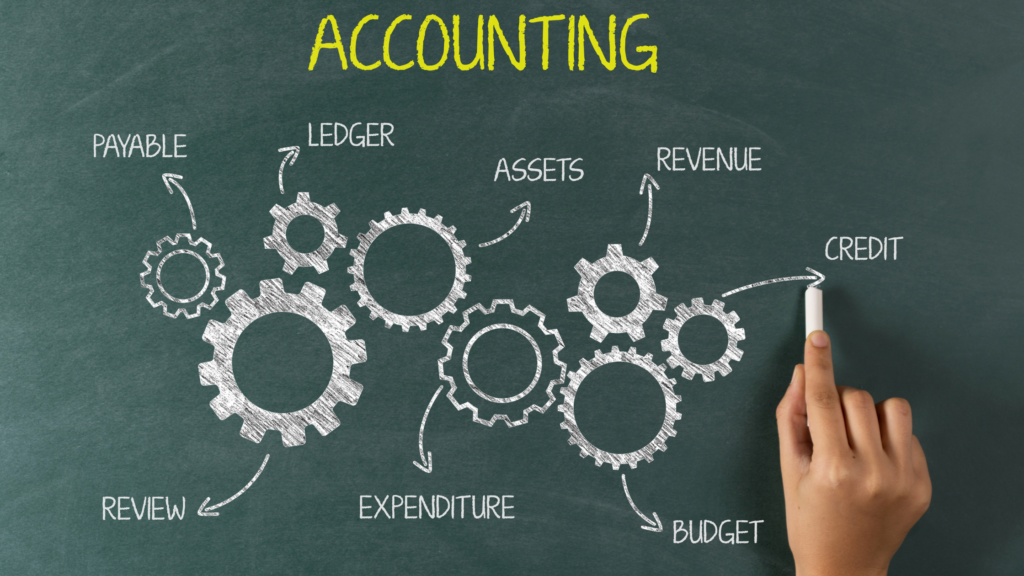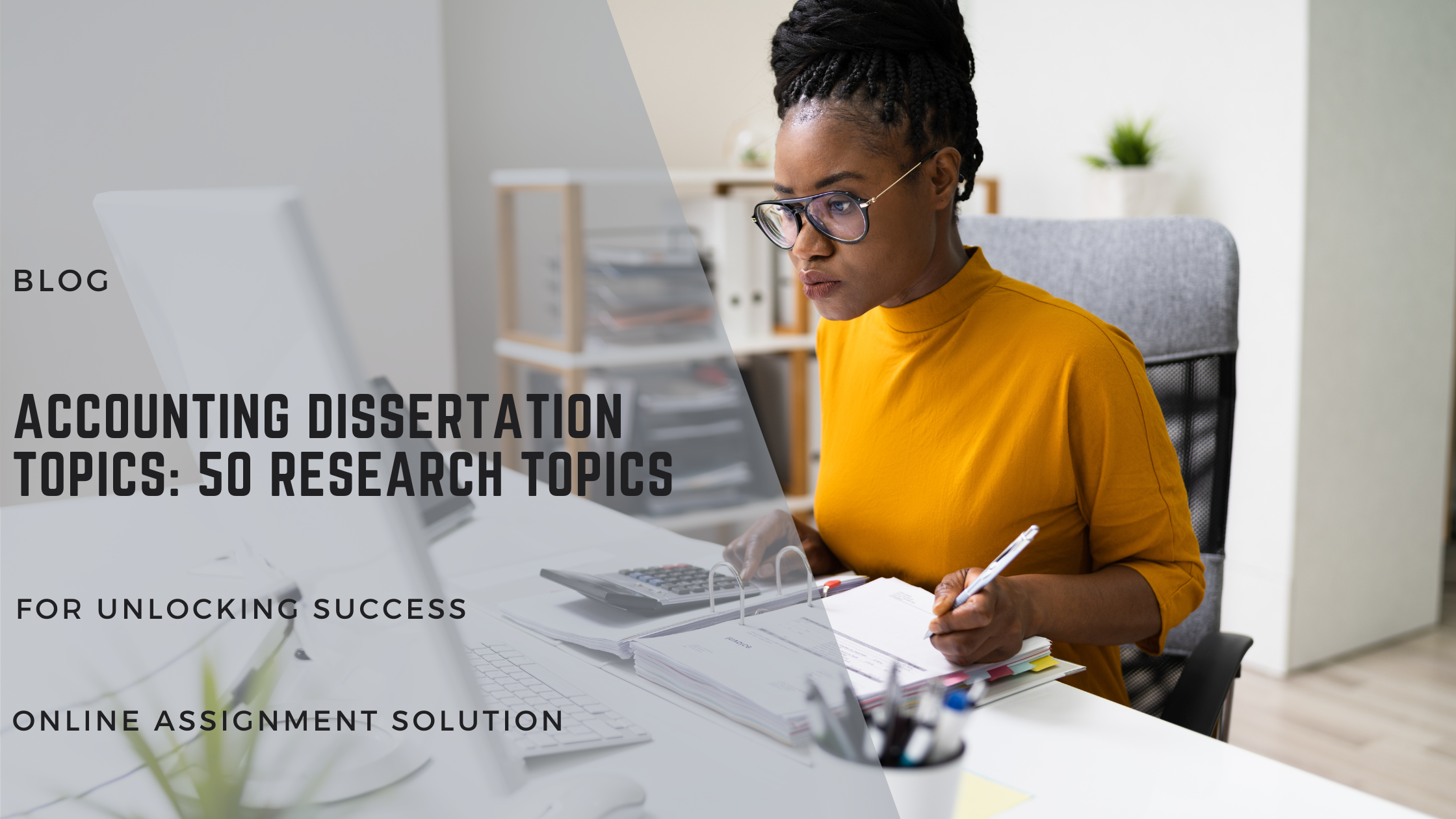Introduction
Welcome to this comprehensive guide on accounting dissertation topics. If you are pursuing a degree in accounting or a related field, you understand the importance of in-depth research and analysis in this domain. As you delve into the world of accounting, you’ll encounter various complex concepts and practices that require extensive investigation.
This article aims to provide you with a wealth of inspiration for your accounting dissertation. We will explore a wide range of engaging topics, ensuring that you find the perfect subject to captivate your audience and demonstrate your expertise. Whether you’re interested in financial reporting, auditing, taxation, or any other aspect of accounting, this guide has got you covered.
Accounting Dissertation Topics: Unveiling the Possibilities
The Impact of Financial Reporting on Stakeholder Decision-Making
Financial reporting is a crucial component of accounting, enabling stakeholders to make informed decisions. In this section, we will examine the influence of financial reporting on various stakeholders, including investors, creditors, and regulators. We’ll explore the challenges faced by accountants in ensuring accurate and transparent reporting practices.
Enhancing Corporate Governance: The Role of Auditing
Corporate governance plays a vital role in maintaining transparency and accountability within organizations. Here, we will investigate the significance of auditing in enhancing corporate governance practices. You’ll gain insights into the responsibilities of auditors and the measures taken to prevent fraud and mismanagement.
Exploring the Complexities of International Taxation
As businesses expand globally, international taxation becomes increasingly intricate. In this segment, we will delve into the complexities of international taxation systems, analyzing the challenges faced by multinational corporations. You’ll gain a deeper understanding of transfer pricing, double taxation agreements, and the impact of tax havens on global economies.
Sustainability Reporting: A Green Approach to Accounting
In recent years, sustainability reporting has gained significant importance, reflecting the growing concerns for the environment. This section will explore the integration of sustainability into accounting practices. We’ll examine the role of accountants in measuring and reporting environmental impact, as well as the potential benefits and challenges of adopting sustainable accounting practices.
Financial Risk Management: Navigating Uncertain Waters
Effective risk management is vital for businesses to thrive in today’s dynamic market. Here, we will analyze the role of accounting in identifying, assessing, and mitigating financial risks. You’ll gain insights into risk measurement techniques, hedging strategies, and the impact of risk management on business performance.
The Use of Big Data Analytics in Financial Decision-Making
As technology continues to evolve, big data analytics has emerged as a powerful tool in financial analysis. In this section, we will explore how accountants leverage big data to facilitate decision-making processes. We’ll delve into predictive analytics, data visualization, and the ethical considerations surrounding the use of big data in accounting.
Ethical Considerations in Financial Reporting
Maintaining ethical standards is crucial for the integrity of financial reporting. Here, we will examine the ethical dilemmas faced by accountants and auditors. You’ll gain insights into the ethical principles governing the profession and explore real-life case studies highlighting the consequences of unethical practices.
The Role of Artificial Intelligence in Accounting
Artificial intelligence (AI) is revolutionizing various industries, and accounting is no exception. In this segment, we will discuss the applications of AI in accounting processes, such as automated bookkeeping, fraud detection, and financial forecasting. We’ll also explore the potential impact of AI on the accounting profession.
The Evolution of Accounting Standards: From GAAP to IFRS
Over time, accounting standards have undergone significant transformations. This section will trace the evolution of accounting standards, comparing the Generally Accepted Accounting Principles (GAAP) to the International Financial Reporting Standards (IFRS). You’ll gain insights into the reasons behind the shift towards global harmonization and the challenges faced during the transition.
Analyzing the Implications of Blockchain Technology on Accounting
Blockchain technology has gained considerable attention due to its potential to revolutionize financial transactions. Here, we will explore the impact of blockchain on accounting practices, such as improving transparency, enhancing audit trails, and streamlining financial reporting. We’ll also discuss the challenges and future prospects of integrating blockchain into the accounting ecosystem.

Certainly! Here are 50 accounting dissertation topics for you:
- The impact of IFRS adoption on financial reporting quality.
- The role of corporate governance in preventing financial fraud.
- The effect of financial leverage on firm performance.
- The relationship between earnings management and corporate governance.
- The impact of audit quality on earnings management.
- The role of internal controls in detecting and preventing fraud.
- The effect of tax avoidance on firm value.
- The relationship between corporate social responsibility and financial performance.
- The impact of financial reporting transparency on investor decision-making.
- The role of accounting information systems in enhancing organizational performance.
- The effect of fair value accounting on financial stability.
- The relationship between CEO compensation and firm performance.
- The impact of auditor independence on financial reporting quality.
- The role of accounting standards in harmonizing international financial reporting.
- The effect of accounting conservatism on earnings management.
- The relationship between corporate governance and risk management.
- The impact of financial reporting quality on cost of capital.
- The role of forensic accounting in fraud investigation.
- The effect of corporate social responsibility reporting on stakeholder perceptions.
- The relationship between intellectual capital and firm value.
- The impact of financial distress on earnings management.
- The role of sustainability reporting in enhancing corporate accountability.
- The effect of accounting information quality on investment decisions.
- The relationship between corporate governance and earnings quality.
- The impact of corporate tax avoidance on government revenue.
- The role of accounting information in predicting stock returns.
- The effect of IFRS adoption on earnings management.
- The relationship between auditor tenure and financial reporting quality.
- The impact of financial regulations on banking sector stability.
- The role of risk management in corporate governance.
- The effect of accounting conservatism on firm valuation.
- The relationship between corporate governance and firm performance.
- The impact of accounting education on professional competence.
- The role of auditors in detecting and preventing financial statement fraud.
- The effect of corporate governance on dividend policy.
- The relationship between environmental accounting and sustainable development.
- The impact of accounting information on credit risk assessment.
- The role of internal audit in corporate governance.
- The effect of financial reporting quality on analyst forecasts.
- The relationship between corporate governance and executive compensation.
- The impact of tax incentives on firm investment decisions.
- The role of accounting in measuring and managing intangible assets.
- The effect of earnings quality on stock price volatility.
- The relationship between accounting information and market efficiency.
- The impact of accounting regulations on small and medium-sized enterprises.
- The role of management accounting in strategic decision-making.
- The effect of financial reporting quality on M&A activity.
- The relationship between accounting information and firm liquidity.
- The impact of fair value accounting on financial statement comparability.
- The role of accounting in detecting and preventing money laundering.
Feel free to choose a topic that interests you the most and aligns with your research goals. Good luck with your dissertation!
Accounting Dissertation Topics: Frequently Asked Questions (FAQs)
FAQ 1: How do I choose the right accounting dissertation topic?
Choosing the right accounting dissertation topic can be challenging. Consider your personal interests, future career aspirations, and the relevance of the topic to the accounting field. Engage in extensive research to identify current trends and gaps in existing literature. Consult with your professors and seek their guidance to ensure you select a compelling and impactful topic.
Yes, universities often have specific formatting guidelines for dissertations. Familiarize yourself with the required citation style (e.g., APA, MLA) and formatting specifications. Pay attention to headings, subheadings, in-text citations, and the overall structure of the dissertation. Adhering to these guidelines will ensure your work meets the academic standards.
FAQ 3: Can I explore interdisciplinary topics in my accounting dissertation?
Absolutely! Accounting is a multidisciplinary field that intersects with various domains such as finance, economics, and information technology. Exploring interdisciplinary topics can add depth and richness to your dissertation. However, ensure that the primary focus remains on accounting and its implications.
FAQ 4: How can I conduct effective research for my accounting dissertation?
To conduct effective research, start by developing a well-defined research question or hypothesis. Utilize both primary and secondary sources, such as academic journals, books, and reputable websites. Engage in qualitative and quantitative research methods, including surveys, interviews, and data analysis. Critically evaluate the collected data and present your findings in a clear and logical manner.
FAQ 5: What are some potential career paths for accounting graduates?
Accounting graduates have a wide array of career opportunities. Some popular career paths include becoming a certified public accountant (CPA), financial analyst, auditor, tax consultant, or management accountant. Additionally, you can pursue academic or research positions, contribute to policymaking, or even venture into entrepreneurship.
FAQ 6: How can I ensure the originality and authenticity of my accounting dissertation?
Maintaining the originality and authenticity of your dissertation is crucial. To ensure this, always cite your sources accurately and adhere to proper referencing guidelines. Utilize plagiarism detection tools to check for any unintentional similarities with existing works. Additionally, conduct thorough research and contribute novel insights to the field to make your dissertation stand out.
Conclusion
Congratulations on reaching the end of this extensive guide on accounting dissertation topics. We have explored a diverse range of captivating subjects, encompassing various areas of accounting. Remember to choose a topic that aligns with your interests, showcases your expertise, and contributes to the advancement of the field.
As you embark on your dissertation journey, immerse yourself in extensive research, engage in critical analysis, and present your findings in a clear and compelling manner. Your dissertation is an opportunity to make a significant impact in the accounting domain and establish yourself as a knowledgeable professional.
Online Assignment Solution can be a valuable resource for English students seeking assistance with writing their dissertations. Firstly, this platform offers access to a pool of highly qualified and experienced academic writers specializing in English studies. These experts possess in-depth knowledge of the subject matter, research methodologies, and academic writing conventions specific to dissertations. We can provide valuable guidance and support throughout the writing process, from selecting a relevant topic to structuring the dissertation effectively. With our expertise, we can help students develop strong thesis statements, conduct comprehensive literature reviews, analyse findings, and craft compelling arguments. The writers can also assist in refining the language and style of the dissertation, ensuring clarity, coherence, and adherence to academic standards.

Secondly, Online Assignment Solution offers the convenience of personalised and flexible services. Students can communicate with their assigned writers, discuss their requirements, and provide specific guidelines or materials related to their dissertation. This personalised approach allows for tailored assistance, ensuring that the dissertation reflects the student’s unique research interests and writing style. Additionally, this platform often offers revisions and editing services, allowing students to receive feedback and make necessary improvements to their drafts. By availing our services, students can save time and focus on other aspects of their academic journey while receiving professional guidance to enhance the quality of their English dissertations.
Overall, Online Assignment Solution serves as a valuable support system for English students working on their dissertations. We provide access to expert writers, personalised assistance, and convenient services, enabling students to overcome challenges and produce well-written, high-quality dissertations that showcase their knowledge and academic abilities.

